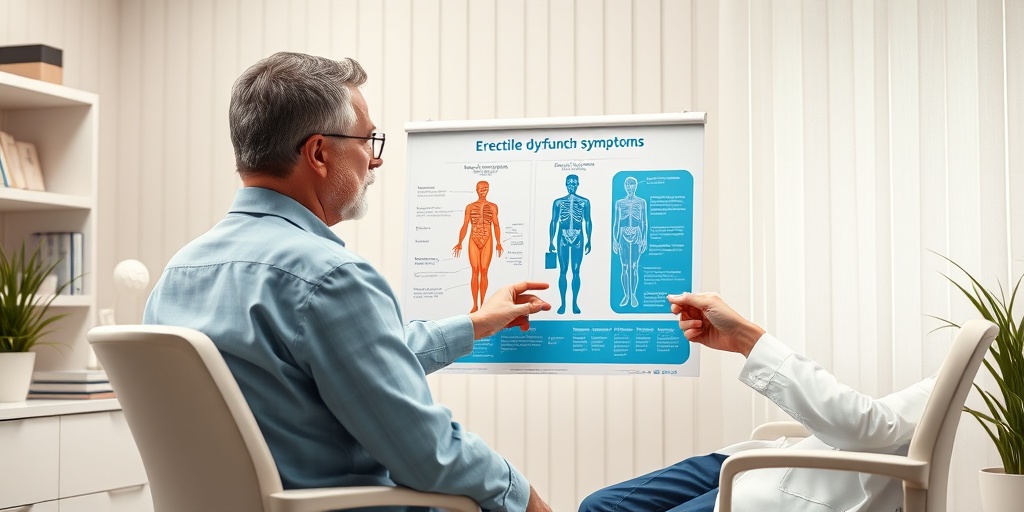What Is Erectile Dysfunction?
Erectile dysfunction (ED) is a common condition that affects millions of men worldwide. It is defined as the inability to achieve or maintain an erection sufficient for satisfactory sexual performance. While occasional difficulties with erections are normal, persistent issues can indicate underlying health problems. Understanding the meaning of erectile dysfunction is crucial for addressing the condition effectively.
The Importance of Recognizing ED
Recognizing erectile dysfunction is the first step toward seeking help. Many men may feel embarrassed or reluctant to discuss their symptoms, but it’s essential to understand that ED is a medical condition, not a reflection of masculinity. It can stem from various causes, including physical, psychological, or a combination of both.
Common Causes of Erectile Dysfunction
Several factors can contribute to erectile dysfunction, including:
- Physical Causes: Conditions such as diabetes, heart disease, high blood pressure, and obesity can impair blood flow, leading to ED.
- Psychological Causes: Stress, anxiety, depression, and relationship issues can significantly impact sexual performance.
- Lifestyle Factors: Smoking, excessive alcohol consumption, and lack of physical activity can also increase the risk of developing ED.
Understanding these causes can help men take proactive steps toward improving their sexual health. If you suspect you have erectile dysfunction, consulting a healthcare professional is vital for proper diagnosis and treatment.
Erectile Dysfunction Symptoms
The symptoms of erectile dysfunction can vary from person to person, but they generally include:
- Difficulty Achieving an Erection: Struggling to get an erection during sexual arousal.
- Difficulty Maintaining an Erection: Losing an erection during sexual activity.
- Reduced Sexual Desire: A noticeable decrease in libido or sexual interest.
When to Seek Help
If you experience any of these symptoms regularly, it’s important to consult a healthcare provider. Early intervention can lead to more effective treatment for erectile dysfunction and help address any underlying health issues. Remember, you are not alone, and many men face similar challenges.
Exploring Treatment Options
There are various erectile dysfunction treatments available, ranging from lifestyle changes to medications. Some common options include:
- Medications: Drugs like Viagra (sildenafil) are often prescribed to help increase blood flow to the penis, facilitating an erection.
- Counseling: If psychological factors are contributing to ED, therapy can be beneficial.
- Lifestyle Changes: Improving diet, exercising regularly, and quitting smoking can significantly enhance sexual health.
Additionally, some people wonder, “Does baking soda help erectile dysfunction?” While baking soda is often touted for various health benefits, there is no scientific evidence to support its effectiveness in treating ED. It’s always best to consult with a healthcare professional for safe and effective treatment options.
Conclusion
Erectile dysfunction is a manageable condition, and understanding its symptoms and causes is the first step toward recovery. If you or someone you know is struggling with ED, don’t hesitate to reach out for help. Resources like Yesil Health AI can provide evidence-based answers to your health questions, guiding you toward the right treatment options. Remember, taking action is key to regaining confidence and improving your sexual health! 💪

Erectile Dysfunction Causes
Erectile dysfunction (ED) is a condition that affects many men, leading to difficulties in achieving or maintaining an erection. Understanding the causes of erectile dysfunction is crucial for effective treatment and management. The causes can be broadly categorized into physical and psychological factors.
Physical Causes
Physical causes of erectile dysfunction are often related to underlying health conditions. Here are some of the most common:
- Cardiovascular Diseases: Conditions like atherosclerosis (hardening of the arteries) can restrict blood flow to the penis, making it difficult to achieve an erection.
- Diabetes: High blood sugar levels can damage blood vessels and nerves, leading to erectile dysfunction.
- Hormonal Imbalances: Low testosterone levels can significantly impact sexual function and libido.
- Neurological Disorders: Conditions such as Parkinson’s disease and multiple sclerosis can interfere with nerve signals from the brain to the penis.
- Chronic Kidney Disease: This can lead to hormonal changes and nerve damage, contributing to erectile dysfunction.
Psychological Causes
In addition to physical factors, psychological issues can also play a significant role in erectile dysfunction:
- Stress and Anxiety: Performance anxiety or stress from work or personal life can lead to temporary erectile dysfunction.
- Depression: Mental health issues can affect libido and sexual performance.
- Relationship Problems: Issues with a partner can create emotional barriers that hinder sexual function.
Understanding these causes is the first step toward finding the right erectile dysfunction treatment. If you suspect that you are experiencing ED, it is essential to consult a healthcare professional for a proper diagnosis and treatment plan.
Erectile Dysfunction Risk Factors
Several risk factors can increase the likelihood of developing erectile dysfunction. Being aware of these factors can help in prevention and early intervention.
Age
As men age, the risk of erectile dysfunction increases. While it is not an inevitable part of aging, older men are more likely to experience health issues that contribute to ED.
Health Conditions
Certain health conditions can significantly raise the risk of erectile dysfunction:
- Obesity: Excess weight can lead to hormonal changes and reduced blood flow, both of which can contribute to ED.
- High Blood Pressure: This condition can damage blood vessels, affecting blood flow to the penis.
- High Cholesterol: Elevated cholesterol levels can lead to atherosclerosis, further restricting blood flow.
Lifestyle Choices
Unhealthy lifestyle choices can also increase the risk of erectile dysfunction:
- Smoking: Tobacco use can impair blood flow and lead to vascular diseases.
- Excessive Alcohol Consumption: While moderate drinking may not cause issues, heavy drinking can lead to erectile dysfunction.
- Lack of Physical Activity: A sedentary lifestyle can contribute to obesity and cardiovascular problems.
Psychological Factors
As mentioned earlier, psychological factors such as stress, anxiety, and depression can also increase the risk of erectile dysfunction. Addressing mental health is just as important as managing physical health.
In conclusion, understanding the causes and risk factors of erectile dysfunction is essential for effective management. If you or someone you know is struggling with ED, seeking professional help can lead to effective treatment options and improved quality of life. Remember, you are not alone, and help is available! 💪✨

Erectile Dysfunction Diagnosis
Erectile dysfunction (ED) is a common condition that affects many men at some point in their lives. Understanding the meaning of erectile dysfunction is crucial for those experiencing difficulties with sexual performance. But how is this condition diagnosed? Let’s explore the process of diagnosing erectile dysfunction and what you can expect during a medical evaluation.
Understanding the Symptoms
The first step in diagnosing erectile dysfunction is recognizing the symptoms. Common signs include:
- Difficulty achieving an erection
- Inability to maintain an erection
- Reduced sexual desire
If you experience any of these symptoms consistently, it’s important to consult a healthcare professional. They can help determine whether your symptoms are indicative of erectile dysfunction or if there might be other underlying issues.
Medical History and Physical Examination
During your visit, the doctor will likely start with a thorough medical history. This includes discussing:
- Your sexual history and any changes in sexual function
- Existing medical conditions (e.g., diabetes, heart disease)
- Medications you are currently taking
A physical examination will also be conducted to check for any physical causes of erectile dysfunction. This may involve examining the genital area and assessing your overall health.
Diagnostic Tests
In some cases, additional tests may be necessary to pinpoint the cause of erectile dysfunction. These tests can include:
- Blood tests to check hormone levels, blood sugar, and cholesterol
- Urinalysis to assess for diabetes or other conditions
- Ultrasound to evaluate blood flow to the penis
These tests help your doctor understand the underlying factors contributing to your condition and guide them in recommending appropriate erectile dysfunction treatment.
Erectile Dysfunction Treatment Options
Once diagnosed, there are several treatment options for erectile dysfunction available. The right choice depends on the underlying cause, severity of the condition, and personal preferences. Here’s a look at some of the most common treatments:
Medications
One of the most well-known treatments for erectile dysfunction is medication. Erectile dysfunction pills, such as Viagra, are often prescribed to help improve blood flow to the penis, making it easier to achieve and maintain an erection. Other medications include:
- Cialis (tadalafil)
- Levitra (vardenafil)
- Stendra (avanafil)
These medications work by enhancing the effects of nitric oxide, a natural chemical in the body that relaxes muscles in the penis and increases blood flow.
Therapy and Counseling
Sometimes, erectile dysfunction can be linked to psychological factors such as anxiety, depression, or relationship issues. In such cases, therapy and counseling can be effective. A mental health professional can help address these underlying issues, improving both emotional well-being and sexual function.
Vacuum Erection Devices
For those who prefer a non-invasive option, vacuum erection devices (VEDs) can be a viable solution. These devices create a vacuum around the penis, drawing blood into it and causing an erection. Once achieved, a constriction ring is placed at the base of the penis to maintain the erection during intercourse.
Penile Implants
In cases where other treatments have failed, surgical options such as penile implants may be considered. This involves placing a device inside the penis that allows for an erection when desired. While this option is more invasive, it can be highly effective for men with severe erectile dysfunction.
Lifestyle Changes
In addition to medical treatments, making certain lifestyle changes can significantly improve erectile dysfunction. Consider the following:
- Regular exercise to improve blood circulation
- Healthy diet rich in fruits, vegetables, and whole grains
- Avoiding smoking and limiting alcohol consumption
These changes not only enhance sexual health but also contribute to overall well-being.
Alternative Remedies
Some individuals may wonder, “Does baking soda help erectile dysfunction?” While baking soda is often touted for various health benefits, there is limited scientific evidence to support its effectiveness in treating erectile dysfunction. Always consult with a healthcare provider before trying any alternative remedies.
In conclusion, diagnosing and treating erectile dysfunction involves a comprehensive approach tailored to individual needs. By understanding the options available, you can take proactive steps towards improving your sexual health and overall quality of life. 🌟

Erectile Dysfunction Lifestyle Changes
Erectile dysfunction (ED) is a common condition that affects many men at some point in their lives. While medical treatments like Viagra and other erectile dysfunction medications are widely known, making certain lifestyle changes can significantly improve erectile function and overall sexual health. Here are some effective lifestyle changes to consider:
1. Maintain a Healthy Diet
Your diet plays a crucial role in your sexual health. A balanced diet rich in fruits, vegetables, whole grains, and lean proteins can help improve blood flow and reduce the risk of conditions that contribute to ED. Consider incorporating the following foods into your meals:
- Fruits and Vegetables: Berries, bananas, spinach, and tomatoes are excellent choices.
- Healthy Fats: Avocados, nuts, and olive oil can support heart health.
- Lean Proteins: Fish, chicken, and legumes can help maintain a healthy weight.
2. Exercise Regularly
Physical activity is essential for maintaining a healthy body and mind. Regular exercise can improve circulation, boost testosterone levels, and enhance mood, all of which are beneficial for combating erectile dysfunction. Aim for at least 30 minutes of moderate exercise most days of the week. Activities like:
- Walking or Jogging: Great for cardiovascular health.
- Strength Training: Helps build muscle and improve metabolism.
- Yoga: Can enhance flexibility and reduce stress.
3. Manage Stress
Stress and anxiety can significantly impact sexual performance. Finding effective ways to manage stress is crucial. Consider practices such as:
- Meditation: Helps calm the mind and reduce anxiety.
- Deep Breathing Exercises: Can lower stress levels and improve focus.
- Mindfulness: Encourages living in the moment and can enhance sexual experiences.
4. Limit Alcohol and Quit Smoking
Excessive alcohol consumption and smoking can contribute to erectile dysfunction. Limiting alcohol intake and quitting smoking can improve blood flow and overall health. If you need help quitting, consider seeking support from healthcare professionals or support groups.
5. Get Enough Sleep
Quality sleep is vital for overall health and can significantly affect sexual function. Aim for 7-9 hours of sleep per night to help regulate hormones and improve mood. If you have trouble sleeping, consider establishing a bedtime routine or consulting a healthcare provider.
Erectile Dysfunction and Mental Health
The relationship between erectile dysfunction and mental health is complex and multifaceted. Understanding how these two aspects interact can help in managing ED effectively.
1. The Psychological Impact of ED
Experiencing erectile dysfunction can lead to feelings of embarrassment, anxiety, and low self-esteem. These feelings can create a vicious cycle, where anxiety about sexual performance exacerbates the problem. It’s essential to recognize that ED is a common issue and seeking help is a sign of strength.
2. Anxiety and Depression
Many men with erectile dysfunction also experience anxiety or depression. These mental health conditions can contribute to or worsen ED. Addressing mental health through therapy, counseling, or support groups can be beneficial. Cognitive-behavioral therapy (CBT) is particularly effective in helping individuals manage anxiety and improve their sexual health.
3. Communication with Partners
Open communication with your partner about erectile dysfunction can alleviate some of the stress associated with the condition. Discussing feelings, concerns, and desires can strengthen your relationship and create a supportive environment. Remember, you are not alone in this journey, and sharing your experiences can foster intimacy and understanding.
4. Seeking Professional Help
If you find that mental health issues are significantly impacting your erectile dysfunction, it may be time to seek professional help. A healthcare provider can offer guidance on both medical treatments and mental health support. They may recommend therapy, medication, or a combination of both to address the underlying issues.
In conclusion, making lifestyle changes and addressing mental health can play a significant role in managing erectile dysfunction. By focusing on a healthy lifestyle and seeking support when needed, you can improve your sexual health and overall well-being. 🌟

Frequently Asked Questions about Erectile Dysfunction
What is Erectile Dysfunction?
Erectile Dysfunction refers to the inability to achieve or maintain an erection sufficient for satisfactory sexual performance. This condition can affect men of all ages but is more common in older adults. Understanding the meaning of erectile dysfunction is crucial for seeking appropriate treatment.
What are the common symptoms of Erectile Dysfunction?
- Difficulty getting an erection
- Trouble maintaining an erection during sexual activities
- Reduced sexual desire
What are the causes of Erectile Dysfunction?
There are various factors that can contribute to erectile dysfunction, including:
- Physical conditions such as diabetes, heart disease, and obesity
- Psychological factors like stress, anxiety, and depression
- Certain medications and lifestyle choices, including smoking and excessive alcohol consumption
What treatments are available for Erectile Dysfunction?
There are several treatment options for erectile dysfunction, including:
- Medications: Commonly prescribed medications include Viagra, Cialis, and Levitra.
- Counseling: Therapy can help address psychological factors contributing to the condition.
- Lifestyle changes: Improving diet, exercising, and quitting smoking can enhance sexual health.
Does baking soda help with Erectile Dysfunction?
While some people may wonder, does baking soda help erectile dysfunction? There is no scientific evidence to support this claim. It’s essential to consult a healthcare professional for effective treatments.
How can I talk to my doctor about Erectile Dysfunction?
When discussing erectile dysfunction with your doctor, consider the following tips:
- Be honest about your symptoms and concerns.
- Discuss any medications you are currently taking.
- Ask about potential treatment options and what might work best for you.
Is Erectile Dysfunction a common issue?
Yes, erectile dysfunction is a common condition that affects millions of men worldwide. It is important to remember that it is a treatable condition, and seeking help is the first step towards improvement.
Where can I find more information about Erectile Dysfunction?
For more information, consider visiting reputable health websites or consulting with a healthcare provider who specializes in sexual health. They can provide you with the latest research and treatment options available.




